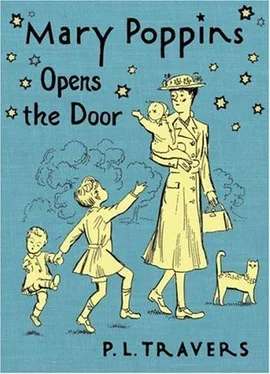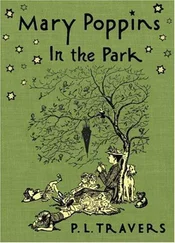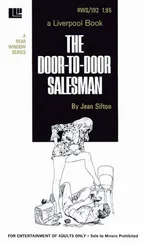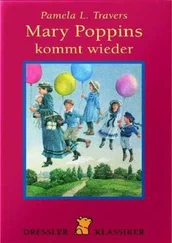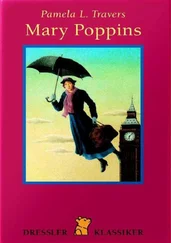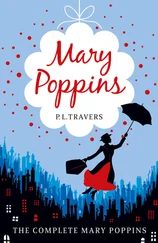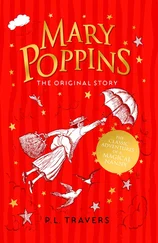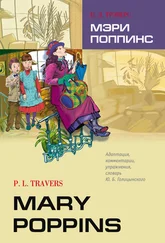P. L. Travers
Mary Poppins Opens the Door

First published 1943
The Library of Congress has cataloged an earlier edition as follows:
Travers, P. L., 1899–1996.
Mary Poppins opens the door/P. L. Travers.
p. cm.
Summary: Mary Poppins returns to the Banks family in a
rocket and involves the Banks children in more magical adventures,
including those with Peppermint Horses, the Marble Boy,
and the Cat That Looked at the King.
[1. Fantasy.] I. Shepard, Mary, 1909– ill. II. Sims, Agnes. III. Title.
PZ7.T689Mat10 1997
[Fic] 75-30697
ISBN-13: 978-0-15-201722-4 ISBN-10: 0-15-201722-4
Text set in Old Style 7
Display type hand-lettered by Georgia Deaver
Designed by April Ward
Printed in the United States of America
K M N L
TO
KATHARINE
CORNELL

A day in the Park
NOTE
The Fifth of November is Guy Fawkes' Day in England. In peacetime it is celebrated with bonfires on the greens, fireworks in the parks and the carrying of "guys" through the streets. "Guys" are stuffed, straw figures of unpopular persons; and after they have been shown to everybody they are burnt in the bonfires amid great acclamation. The children black their faces and put on comical clothes, and go about begging for a Penny for the Guy. Only the very meanest people refuse to give pennies and these are always visited by Extreme Bad Luck.
The Original Guy Fawkes was one of the men who took part in the Gunpowder Plot. This was a conspiracy for blowing up King James I and the Houses of Parliament on November 5 th, 1605. The plot was discovered, however, before any damage was done. The only result was that King James and his Parliament went on living but Guy Fawkes, poor man, did not. He was executed with the other conspirators. Nevertheless, it is Guy Fawkes who is remembered today and King James who is forgotten. For since that time, the Fifth of November in England, like the Fourth of July in America, has been devoted to Fireworks. From 1605 till 1939 every village green in the shires had a bonfire on Guy Fawkes' Day. In the village where I live, in Sussex, we made our bonfire in the Vicarage paddock and every year, as soon as it was lit, the Vicar's cow would begin to dance. She danced while the flames roared up to the sky, she danced till the ashes were black and cold. And the next morning — it was always the same — the Vicar would have no milk for his breakfast. It is strange to think of a simple cow rejoicing so heartily at the saving of Parliament so many years ago.
Since 1939, however, there have been no bonfires on the village greens. No fireworks gleam in the blackened parks and the streets are dark and silent. But this darkness will not last forever. There will some day come a Fifth of November — or another date, it doesn't matter — when fires will burn in a chain of brightness from Land's End to John O'Groats. The children will dance and leap about them as they did in the times before. They will take each other by the hand and watch the rockets breaking, and afterwards they will go home singing to the houses full of light….
P. L. T. (1943)
CHAPTER I
THE FIFTH OF NOVEMBER
* * *
IT WAS one of those bleak and chilly mornings that remind you winter is coming. Cherry-Ttee Lane was quiet and still. The mist hung over the Park like a shadow. All the houses looked exactly alike as the grey fog wrapped them round. Admiral Boom's flagstaff, with the telescope at the top of it, had entirely disappeared.
The Milkman, as he turned into the Lane, could hardly see his way.
"Milk Be-l-o-o-ow!" he called, outside the Admiral's door. And his voice sounded so queer and hollow that it gave him quite a fright.
"I'll go 'ome till the fog lifts," he said to himself. "'Ere! Look where you're goin'!" he went on, as a shape loomed suddenly out of the mist and bumped against his shoulder.
"Bumble, bumble, bum-bur-um-bumble," said a gentle, muffled voice.
"Oh, it's you!" said the Milkman, with a sigh of relief.
"Bumble," remarked the Sweep again. He was holding his brushes in front of his face to keep his moustache dry.
"Out early, aren't you?" the Milkman said.
The Sweep gave a jerk of his black thumb towards Miss Lark's house.
"Had to do the chimbley before the dogs had breakfast. In case the soot gave them a cough," he explained.
The Milkman laughed rudely. For that was what everybody did when Miss Lark's two dogs were mentioned.
The mist went wreathing through the air. There was not a sound in the Lane.
"Ugh!" said the Milkman, shivering. "This quiet gives me the 'Orrors!"
And as he said that, the Lane woke up. A sudden roar came from one of the houses and the sound of stamping feet.
"That's Number Seventeen!" said the Sweep. "Excuse me, old chap. I think I'm needed." He cautiously felt his way to the gate and went up the garden path….
Inside the house, Mr. Banks was marching up and down, kicking the hall furniture.
"I've had about all I can stand!" he shouted, waving his arms wildly.
"You keep on saying that," Mrs. Banks cried. "But you won't tell me what's the matter." She looked at Mr. Banks anxiously.
"Everything's the matter!" he roared. "Look at this!" He waggled his right foot at her. "And this!" he went on, as he waggled his left.
Mrs. Banks peered closely at the feet. She was rather short-sighted and the hall was misty.
"I — er — don't see anything wrong," she began timidly.
"Of course you don't!" he said, sarcastically. "It's only imagination, of course, that makes me think Robertson Ay has given me one black shoe and one brown!" And again he waggled his feet.
"Oh!" said Mrs. Banks hurriedly. For now she saw clearly what the trouble was.
"You may well say 'Oh!' So will Robertson Ay when I give him the sack tonight."
"It's not his fault, Daddy!" cried Jane, from the stairs. "He couldn't see — because of the fog. Besides, he's not strong."
"He's strong enough to make my life a misery!" said Mr. Banks angrily.
"He needs rest, Daddy!" Michael reminded him, hurrying down after Jane.
"He'll get it!" promised Mr. Banks, as he snatched up his bag. "When I think of the things I could have done if I hadn't gone and got married! Lived alone in a Cave, perhaps. Or I might have gone Round the World."
"And what would we have done, then?" asked Michael.
"You would have had to fend for yourselves. And serve you right! Where's my overcoat?"
"You have it on, George," said Mrs. Banks, meekly.
"Yes!" he retorted. "And only one button! But anything's good enough for me! I'm only the man who Pays the Bills. I shall not be home for dinner."
A wail of protest went up from the children.
"But it's Guy Fawkes' Day," wheedled Mrs. Banks. "And you so good at letting off rockets."
"No rockets for me!" cried Mr. Banks. "Nothing but trouble from morning till night!" He shook Mrs. Banks' hand from his arm and dashed out of the house.
"Shake, sir!" said the Sweep in a friendly voice as Mr. Banks knocked into him, "It's lucky, you know, to shake hands with a Sweep."
"Away, away!" said Mr. Banks wildly. "This is not my lucky day!"

Читать дальше
Конец ознакомительного отрывка
Купить книгу
